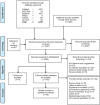Adverse effects of herbal or dietary supplements in G6PD deficiency: a systematic review
- PMID: 27081765
- PMCID: PMC5338162
- DOI: 10.1111/bcp.12976
Adverse effects of herbal or dietary supplements in G6PD deficiency: a systematic review
Abstract
Aim: Glucose-6-phosphate dehydrogenase (G6PD) deficiency is a common genetic disorder, affecting nearly 400 million individuals worldwide. Whilst it is known that a number of drugs, foods and chemicals can trigger haemolysis in G6PD deficient individuals, the association between herbal and dietary supplements and haemolysis is less clear. The objective of this study was to evaluate the association between herbal or dietary supplements and adverse events in G6PD deficient individuals.
Methods: We searched 14 electronic databases from their inception until November 2015 for articles describing the use of herbal or dietary supplements in G6PD deficient individuals. Additional publications were identified from manually searching textbooks, conference abstracts and the grey literature. All study designs were included as long as they contained clinical information. These gathered findings were summarized narratively.
Results: Thirty-two publications met inclusion criteria. These reported on 10 herbal and dietary supplements. Overall evidence linking haemolysis to a herbal/dietary supplement was only found for henna. No evidence of harm was observed for vitamin C, vitamin E, vitamin K, Gingko biloba and α-lipoic acid.
Conclusions: The review showed that there was insufficient evidence to contravene the use of most herbal or dietary products at therapeutic doses in G6PD deficient subjects.
Keywords: glucose-6-phosphate dehydrogenase; herbal medicine; safety; systematic review.
© 2016 The British Pharmacological Society.
References
-
- Nkhoma ET, Poole C, Vannappagari V, Hall SA, Beutler E. The global prevalence of glucose‐6‐phosphate dehydrogenase deficiency: a systematic review and meta‐analysis. Blood Cells Mol Dis 2009; 42: 267–78. - PubMed
-
- Valaes T. Severe neonatal jaundice associated with glucose‐6‐phosphate dehydrogenase deficiency: pathogenesis and global epidemiology. Acta Paediatr Suppl 1994; 394: 58–76. - PubMed
-
- Beutler E. G6PD deficiency. Blood 1994; 84: 3613–36. - PubMed
-
- Youngster I, Arcavi L, Schechmaster R, Akayzen Y, Popliski H, Shimonov J, et al. Medications and glucose‐6‐phosphate dehydrogenase deficiency: an evidence‐based review. Drug Saf 2010; 33: 713–26. - PubMed
-
- Frank JE. Diagnosis and management of G6PD deficiency. Am Fam Physician 2005; 72: 1277–82. - PubMed
Publication types
MeSH terms
Substances
LinkOut - more resources
Full Text Sources
Other Literature Sources
Medical
Miscellaneous


